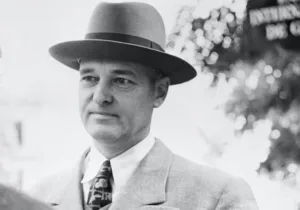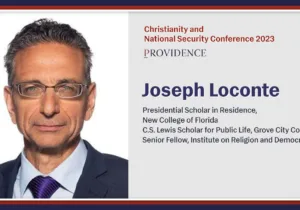Friday I attended a memorial service at Fort Myer for Nixon-era Defense Secretary Melvin Laird, who died in November at age 94. The son of a Presbyterian minister, “his faith never left him,” Laird’s own son recalled of his father during his eulogy at the Fort Myer church. A large honor guard outside the church escorted the horse drawn casket to the grave in adjoining Arlington Cemetery. Mostly white-haired old men were in attendance. Prominent among them was 90-year-old former U.S. Senator John Warner, who was U.S. Navy Secretary under Laird. I saw no current public officials present. Laird, although actively speaking to public issues until almost his end, had been mostly forgotten, undeservedly.
As his son noted in his eulogy, Laird for over 70 years carried in his body shrapnel from a Japanese kamikaze pilot who struck Laird’s destroyer in the Pacific near WWII’s end, for which he won a Purple Heart. Laird was one of the last from the WWII-era generation who governed and directed U.S. security and foreign policy through the Cold War, ultimately successfully. Laird became a military expert during his 16 years as U.S. Congressman from Wisconsin, earning him Nixon’s appointment as Defense Secretary.
Laird revived a Defense Department demoralized by the unending and increasingly unpopular Vietnam War. Although a hawk, he favored gradual U.S. withdrawal from Vietnam, believing the war was distracting from U.S. priorities in countering increased Soviet military spending. He presided over Nixon’s Vietnamization process in which U.S. forces were replaced by South Vietnamese. By Laird’s departure from office in early 1973, nearly all U.S. ground forces were withdrawn. Absent Watergate, South Vietnam perhaps could have survived with continued U.S. arms and air power.
Relations with Nixon’s White House were not always amicable. Kissinger often saw him adversarially, though respectfully as a formidable bureaucrat. A seasoned politician, Laird favored more transparency with the public and his former congressional colleagues than did Nixon and Kissinger, such as over initially secret U.S. operations against North Vietnamese forces in Cambodia. He managed a declining U.S. military budget, making room for new strategic programs like the B1 Bomber and Trident Submarine that would counter a more assertive Soviet strategic stance. He also was central to the first SALT arms control treaty with the Soviets, which was the best the U.S. could likely achieve at that time given its overall post-Vietnam strategic step back. The ABM Treaty against missile defense with the Soviets was also ratified, a more dubious measure that left America reliant on Mutual Assured Destruction. But the U.S. in the doldrums of the early 1970s was likely unready for the Star Wars initiative later launched by President Reagan.
Laird helped end the much resented military draft and helped create an all-volunteer U.S. armed forces. One of his most important legacies was helping elevate Gerald Ford as U.S. House Republican leader and later as Vice President, leading then to the presidency upon Nixon’s resignation. Ford unsuccessfully implored Laird to join his administration, but Laird remained an unofficial advisor. His own plans for running for president or other office were largely blocked. Eisenhower had declared young Congressman Laird was presidential timber, and it is the country’s loss that there was never the opportunity.
In countless ways Laird embodied the old Mainline Protestant political establishment who took to power comfortably and usually responsibly. He and his generation fought in war and deeply believed in America’s duty to avert war through strength and active global engagement. Their patriotism and faith were understated and usually unarticulated but deep. We as a nation relied on them for much of the 20th century, and now that generation is nearly gone.
Will a current or future generation summon the same tenacity and discernment embodied by Laird to lead America amid future challenges and threats? Let’s pray so. Recalling the example of Laird and his generation will be instructive and inspiring. The young Navy chaplain who presided at Laird’s Fort Myer memorial service cited many promises of Christ about eternal life, including “in my Father’s house are many mansions, and I go there to prepare a place for you.” Doubtless Laird has found comfortable space in one of those mansions.






